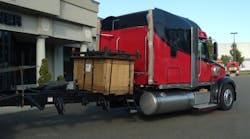The U.S. Environmental Protection Agency (EPA) said this week that it intends to revisit certain provisions of the Phase 2 greenhouse gas (GHG) emissions and fuel efficiency standards that focus on trailers and glider kits.
“In light of the significant issues raised, the agency has decided to revisit the Phase 2 trailer and glider provisions,” said Scott Pruitt, EPA’s Administrator, said in a statement.
Those “issues” in terms of upgrading trailers to meet the Phase 2 GHG standards have been the subject of a lawsuit against the agency by the Truck Trailer Manufacturers Association (TTMA).
Those rules were also viewed as the death knell for building completed glider kits with 1998-era engines for sale to the public, according to comments by J.D. Power Valuation Services (JDVS) last year, as the Phase 2 GHG rules essentially limited the glider kit industry to its original purpose – namely, mating the drivetrain of a wrecked or worn-out truck with a new body and chassis.
By contrast, JDVS said, over the past decade completed glider kits have essentially become an alternative to a new or used truck with post-2002 exhaust emission afteretreatment systems by using rebuilt 1998 engines installed into new OEM glider chassis, with such trucks then stocked on dealers’ lots for sale to the public.
The Phase 2 GHG rules would have eventually ended this practice by capping the number of completed glider kits equipped with pre-2002 engines to the greatest number built in any year between 2010-2014, with provisions beyond 2017 aimed at limiting the use of glider kits to the repair/rebuild business and to use current-level emission-qualified engines, JDVS said.
That may all change due to EPA’s initiative this week. “We intend to initiate a rulemaking process that incorporates the latest technical data and is wholly consistent with our authority under the Clean Air Act,” Pruitt said.
In September 2011, EPA and the National Highway Traffic Safety Administration (NHTSA) issued a series of GHG rules that established standards for model year 2014-2018 medium- and heavy-duty vehicles, known as “Phase 1,” that applied to newly manufactured engines, tractors, vocational vehicles, large pickups, and vans.
In October 2016, EPA and NHTSA then offered a follow-on set of standards for model year 2021-2027 medium- and heavy-duty vehicles, known as “Phase 2,” which as noted above incorporated fuel efficiency rules for trailers and glider kits as well.



